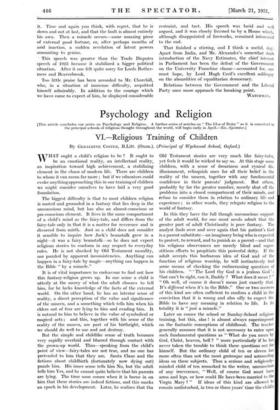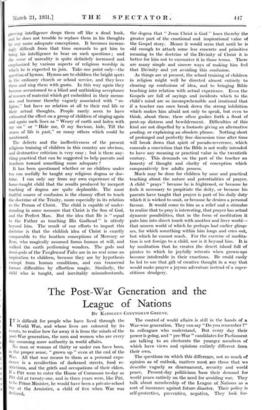Psychology and Religion
[This article concludes our series on Psychology and Religion. A further series of articles on " The Idea of Deity " as it is conceived it, the principal schools of religious thought throughout the world, will begin early in April.—Eo. Spectator.]
VI.—Religious Training of Children
By GERALDINE COSTER, B.Litt. (Oxon.). (Principal of Wychwood School, Oxford.) WHAT ought a child's religion to be ? It ought to be an emotional reality, an intellectual reality, an inspiration toward high achievement, a stabilizing element in the chaos of modern life. There are children to whom it can mean far more ; but if we educators could evoke anything approaching this in our training of children we might consider ourselves to have laid a very good foundation.
The biggest difficulty is that to most children religion is rooted and grounded in a fantasy that lies deep in the unconscious mind, but has also an almost-conscious or pre-conscious element. It lives in the same compartment of a child's mind as the fairy-tale, and differs from the fairy-tale only in that it is a matter for reverence and is divorced from mirth. Just as a child does not consider it sensible to inquire how Jack's beanstalk grew in a night—it was a fairy beanstalk—so he does not expect religious stories to conform in any respect to everyday rules. He is not shocked by Old Testament morality, nor puzzled by apparent inconsistencies. Anything can happen in a fairy-tale by magic—anything can happen in the Bible " by a miracle."
It is of vital importance to endeavour to find out how this fantasy-religion grows up. In one sense a child is utterly at the mercy of what the adult chooses to tell him, for he lacks knowledge of the facts of the external world. On the other hand, he has an interior sense of reality, a direct perception of the value and significance of the unseen, and a something which tells him when his elders out of fear are lying to him and evading him.- It is natural to him to believe in the value of symbolical or magical acts ; and - this, together with his sense of the reality of the unseen, are part of his birthright, which we should do. well to use and not destroy. - But the simple and childlike sense of - truth becomes very rapidly overlaid and blurred through contact with the grown-up world. Thus—speaking from the child's point of view—fairy-tales are not true, and no one has pretended to him that they are. Santa Claus and the fictions about childbirth (fortunately now dying out) puzzle him. His inner sense tells him No, but the adult tells him Yes, and he cannot quite believe that his parents are lying. The time soon comes- when it is borne in on him that these stories are indeed fictions, and this marks an epoch in his development. Later, he realizes that the Old Testament stories are very much like fairy-tales, yet feels it would be wicked to say so. At this stage some children, with a sense of dreariness and cynical dis- illusionment, relinquish once for all their belief in the reality of the unseen, together with any fundamental confidence in their parents' judgment. But others, probably by far the greater number, merely shut off the problems into a closed compartment of their minds, and refuse to consider them in relation to ordinary life and experience ; in other words, they relegate religion to the world of fantasy.
In this they have the full though unconscious support of the adult world, for one must needs admit that the greater part of adult Christianity is pure fantasy. The analyst finds over and over again that his patient's God is a parent-substitute—an imaginary being who is expected to protect, to reward, and to punish as a parent—and that his religious observances are merely blind and super- stitious efforts to propitiate this powerful deity. If the adult accepts this barbarous idea of God and of the function of religious worship, he will instinctively find some means of checking the embarrassing questions of his children. " ' The Lord thy God is a jealous God' ; that can't be right, can it, Daddy ? What does it mean ? " " Oh well, of course it doesn't mean just exactly that. It's different when it's in the Bible." One or two answers Of this kind are often sufficient to confirm a child in the conviction that it is wrong and also silly to expect the -Bible to have -any meaning in relation to life. In its totality it is " just a miracle."
Later on comes the school or Sunday-School religious training, but this, alas ! is almost always superimposed on the fantastic conceptions of childhood.- The teacher generally assumes that it is not necessary to enter upon such fundamental questions as " What do you mean by God, Christ, heaven, hell ? more particularly if he has never taken the trouble to think these questions out for himself. But the ordinary child of ten or eleven has more often than not the most grotesque and astounding ideas on these subjects. Thus a serious and religiously- minded child of ten remarked to the writer, unconscious of any irreverence, " Well, of course God must have arms and legs, or how could He have-iseen married to the Virgin Mary ? " If ideas of this kind are allowed to remain undisturbed, in two or three years' time the child's growing intelligence drops them off like a dead husk, and he does not trouble to replace them in his thoughts by any more adequate conceptions. It becomes increas- ingly difficult from that time onwards to get him to bring his intelligence to bear on such questions ; and the sense of unreality is quite definitely increased and emphasized by various aspects of religious worship in which he is expected to join. Take one point only—the question of hymns. Hymns are to children the bright spots in the ordinary church or school service, and they love them and sing them with gusto. In this way again they become accustomed to a blind and unthinking acceptance of masses of material which get embedded in their memo- ries and become thereby vaguely associated with " re- ligion," but have no relation at all to their real life or their actual thoughts. People rarely seem to have estimated the effect on a group of children of singing again and again such lines as " Weary of earth and laden with my sin " or " Hide me, 0 my Saviour, hide, Till the storm of life is Past," or many others which could be mentioned.
The defects and the ineffectiveness of the present religious training of children in this country are obvious, and destructive criticism is very easy ; but is there any- thing practical that can be suggested to help parents and teachers toward something more adequate ?
It has been questioned whether or no children under ten can usefully be taught any religious dogma or doc- trine. I can only say from my own experience of the home-taught child that the results produced by inexpert teaching of dogma are quite deplorable. The most fruitful source of confusion is the clumsy effort to teach the doctrine of the Trinity, more especially in its relation to the Person of Christ. The child is capable of under- standing in some measure that Christ is the Son of God, and the Perfect Man. But the idea that He is " equal to the Father as touching His Godhead " is utterly beyond him. The result of our efforts to impart this doctrine is that the childish idea of Christ is exactly comparable to the heathen conceptions of Mercury or Zeus, who magically assumed forms human at will, and walked the earth performing wonders. The gods and demi-gods of the Tanglewood Tales are in no real sense an inspiration to children, because they are by hypothesis exempt from human conditions, and can transcend human difficulties by effortless magic. Similarly, the child who is taught, and inevitably misunderstands, the dogma that " Jesus Christ is God " loses thereby the greater part of the ,emotional and inspirational value of the Gospel story. Hence it would seem that until he is old enough to attach some less concrete and primitive meaning to the doctrine of the Divinity of Christ it is better for him not to encounter it in those terms. There are many simple and sincere ways of making him feel that Divinity and yet avoiding this confusion.
As things are at present, the school training.of children in religion might well be directed almost entirely to clearing up confusions of idea, and to bringing Bible teaching into relation with actual experience. Even the Gospels are full of sayings and incidents which to the child's mind are so incomprehensible and irrational that if a teacher can once break down the strong inhibition which makes him afraid not only to speak, but even to think, about these, there often gushes forth a flood of pent-up distress and bewilderment. Difficulties of this kind are not dispelled by a footnote giving an alternative reading, or explaining an obsolete phrase. Nothing short of prolonged and perfectly free discussion time after time will break down that spirit of pseudo-reverence, which conceals a conviction that the Bible is not really intended to have any meaning or practical value in the twentieth century. This demands on the part of the teacher an honesty of thought and clarity of conception which comparatively few adults possess.
Much may be done for children by sane and practical teaching about the nature and potentialities of prayer. A child " prays" because he is frightened, or because he feels it necessary to propitiate the deity, or because his parents have taught that prayer is part of his daily duty which it is wicked to omit, or because he desires a personal favour. It would come to him as a relief and a stimulus to realize that to pray is interesting, that prayer has actual dynamic possibilities, that in the form of meditation it puts him into direct touch with another and freer world— that unseen world of which he perhaps had earlier glimp- ses, for which something within him longs and cries out, but which he cannot reach. For the exercise of medita- tion is not foreign to a child, nor is it beyond him. It is by meditation that he. creates the desert island full of pirates to which he joyfully retreats when grown-ups become intolerable in their exactions. He could easily be led to use that gift of creative thought in a way that would make prayer a joyous adventure instead of a super- stitious drudgery.



















































 Previous page
Previous page